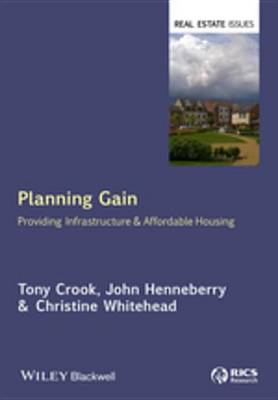Real Estate Issues
1 primary work • 2 total works
Book 52
Winner of the Royal Town Planning Institute award for research excellence
This critical examination of the development and implementation of planning gain is timely given recent changes to the economic and policy environment.
The book looks both at the British context as well as experience in other developed economies and takes...
Winner of the Royal Town Planning Institute award for research excellence
This critical examination of the development and implementation of planning gain is timely given recent changes to the economic and policy environment.
The book looks both at the British context as well as experience in other developed economies and takes stock of how the policy has evolved. It examines the rationale for planning gain, how it has delivered substantial funds for infrastructure and affordable housing and, in the light of this, how it might continue to play a role in the funding of these. It also draws on overseas experience, for example on impact fees and public sector land assembly. It looks at lessons from the past for future policy, both for Britain and for countries overseas.
Mechanisms to tap development value are also a global phenomenon in developed market economies - whether through formal taxation or negotiated contributions. As fiscal austerity becomes an increasingly challenging issue, ‘planning gain’ has grown in importance as a potential source of funding for infrastructure and new affordable housing, with many countries keen to examine, learn from, and adapt the experience of others.
- a critical commentary of planning gain as a policy
- timely post credit crunch analysis
- addresses recent planning policy changes

